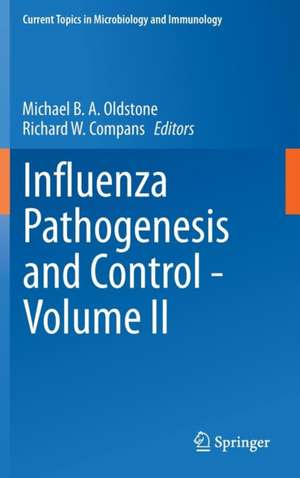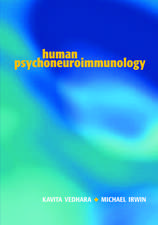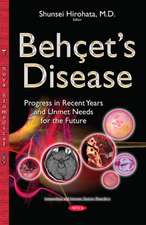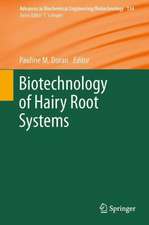Influenza Pathogenesis and Control - Volume II: Current Topics in Microbiology and Immunology, cartea 386
Editat de Michael B. A. Oldstone, Richard W. Compansen Limba Engleză Hardback – 19 noi 2014
| Toate formatele și edițiile | Preț | Express |
|---|---|---|
| Paperback (1) | 1105.04 lei 6-8 săpt. | |
| Springer International Publishing – 23 aug 2016 | 1105.04 lei 6-8 săpt. | |
| Hardback (1) | 1112.17 lei 6-8 săpt. | |
| Springer International Publishing – 19 noi 2014 | 1112.17 lei 6-8 săpt. |
Din seria Current Topics in Microbiology and Immunology
- 18%
 Preț: 962.03 lei
Preț: 962.03 lei - 5%
 Preț: 1123.13 lei
Preț: 1123.13 lei - 5%
 Preț: 1085.92 lei
Preț: 1085.92 lei -
 Preț: 499.76 lei
Preț: 499.76 lei - 5%
 Preț: 967.79 lei
Preț: 967.79 lei - 18%
 Preț: 1118.62 lei
Preț: 1118.62 lei - 5%
 Preț: 717.00 lei
Preț: 717.00 lei - 5%
 Preț: 712.97 lei
Preț: 712.97 lei - 5%
 Preț: 709.51 lei
Preț: 709.51 lei - 5%
 Preț: 709.51 lei
Preț: 709.51 lei - 5%
 Preț: 721.19 lei
Preț: 721.19 lei - 5%
 Preț: 359.78 lei
Preț: 359.78 lei - 5%
 Preț: 711.88 lei
Preț: 711.88 lei - 5%
 Preț: 774.81 lei
Preț: 774.81 lei - 15%
 Preț: 640.06 lei
Preț: 640.06 lei - 5%
 Preț: 717.00 lei
Preț: 717.00 lei - 5%
 Preț: 360.34 lei
Preț: 360.34 lei - 5%
 Preț: 707.69 lei
Preț: 707.69 lei - 5%
 Preț: 717.56 lei
Preț: 717.56 lei - 5%
 Preț: 716.28 lei
Preț: 716.28 lei - 5%
 Preț: 717.20 lei
Preț: 717.20 lei - 5%
 Preț: 711.32 lei
Preț: 711.32 lei - 5%
 Preț: 711.88 lei
Preț: 711.88 lei - 5%
 Preț: 718.29 lei
Preț: 718.29 lei - 5%
 Preț: 709.51 lei
Preț: 709.51 lei - 5%
 Preț: 369.84 lei
Preț: 369.84 lei - 5%
 Preț: 712.25 lei
Preț: 712.25 lei - 5%
 Preț: 716.45 lei
Preț: 716.45 lei - 5%
 Preț: 706.60 lei
Preț: 706.60 lei - 5%
 Preț: 711.52 lei
Preț: 711.52 lei - 5%
 Preț: 713.54 lei
Preț: 713.54 lei - 5%
 Preț: 720.47 lei
Preț: 720.47 lei - 5%
 Preț: 725.42 lei
Preț: 725.42 lei - 5%
 Preț: 708.06 lei
Preț: 708.06 lei - 5%
 Preț: 713.70 lei
Preț: 713.70 lei - 5%
 Preț: 705.83 lei
Preț: 705.83 lei - 5%
 Preț: 710.96 lei
Preț: 710.96 lei - 5%
 Preț: 723.93 lei
Preț: 723.93 lei - 5%
 Preț: 707.69 lei
Preț: 707.69 lei - 5%
 Preț: 715.35 lei
Preț: 715.35 lei - 5%
 Preț: 709.87 lei
Preț: 709.87 lei - 5%
 Preț: 359.05 lei
Preț: 359.05 lei - 5%
 Preț: 374.20 lei
Preț: 374.20 lei - 15%
 Preț: 635.31 lei
Preț: 635.31 lei - 5%
 Preț: 707.86 lei
Preț: 707.86 lei - 5%
 Preț: 721.96 lei
Preț: 721.96 lei - 15%
 Preț: 632.88 lei
Preț: 632.88 lei - 15%
 Preț: 632.05 lei
Preț: 632.05 lei - 15%
 Preț: 642.83 lei
Preț: 642.83 lei
Preț: 1112.17 lei
Preț vechi: 1170.71 lei
-5% Nou
Puncte Express: 1668
Preț estimativ în valută:
212.81€ • 222.79$ • 176.09£
212.81€ • 222.79$ • 176.09£
Carte tipărită la comandă
Livrare economică 05-19 aprilie
Preluare comenzi: 021 569.72.76
Specificații
ISBN-13: 9783319111575
ISBN-10: 3319111574
Pagini: 492
Ilustrații: VIII, 484 p. 36 illus., 34 illus. in color.
Dimensiuni: 155 x 235 x 35 mm
Greutate: 0.86 kg
Ediția:2015
Editura: Springer International Publishing
Colecția Springer
Seria Current Topics in Microbiology and Immunology
Locul publicării:Cham, Switzerland
ISBN-10: 3319111574
Pagini: 492
Ilustrații: VIII, 484 p. 36 illus., 34 illus. in color.
Dimensiuni: 155 x 235 x 35 mm
Greutate: 0.86 kg
Ediția:2015
Editura: Springer International Publishing
Colecția Springer
Seria Current Topics in Microbiology and Immunology
Locul publicării:Cham, Switzerland
Public țintă
ResearchCuprins
The role of cytokine responses during influenza virus pathogenesis and potential therapeutic options.- Innate immune sensing and response to influenza.- The NS1 protein: a multitasking virulence factor.- Role of NK cells in influenza infection.- Host detection and the stealthy phenotype in influenza virus infection.- Inactivated and adjuvanted influenza vaccines.- Live attenuated influenza vaccine.- Design of alternative live attenuated influenza virus vaccines.- Rapid production of synthetic influenza vaccines.- Influenza neuraminidase as a vaccine antigen.- Advances in universal influenza virus vaccine design and antibody mediated therapies based on conserved regions of the hemagglutinin.- Structural characterization of epitopes recognized by broadly cross-reactive antibodies.- Skin immunization with influenza vaccines.- Mucosal immunization and adjuvants.- B cell responses to infection and vaccination.- Memory CD4 T cells in influenza.- The effector T cell response to influenza infection.- Antiviral Effects of Inhibiting Host Gene Expression.
.
.
Notă biografică
Richard W. Compans is a Professor of Microbiology and Immunology and Scientific Director of Influenza Pathogenesis and Immunology Research Center, Emory University School of Medicine, Atlanta, GA, USA and series editor and volume editor of several successful volumes of Current Topics in Microbiology and Immunology. Michael B.A. Oldstone is a professor at the Department of Immunology and Microbial Science, The Scripps Research Institute, La Jolla, CA, USA and series editor and volume editor of several successful volumes of Current Topics in Microbiology and Immunology.
Textul de pe ultima copertă
This two-volume work covers the molecular and cell biology, genetics and evolution of influenza viruses, the pathogenesis of infection, resultant host innate and adaptive immune response, prevention of infection through vaccination and approaches to the therapeutic control of infection.. Experts at the forefront of these areas provide critical assessments with regard to influenza virology, immunology, cell and molecular biology, and pathogenesis. Volume I provides overviews of the latest findings on molecular determinants of viral pathogenicity, virus entry and cell tropism, pandemic risk assessment, transmission and pathogenesis in animal species, viral evolution, ecology and antigenic variation, while Volume II focuses on the role of innate and adaptive immunity in pathogenesis, development of vaccines and antivirals.
Caracteristici
This is the second of two volumes on the topic Together they present an overview of recent progress in this area Both theoretical and practical aspects are covered Up-to-date information for virologists, immunologists, public health professionals and infectious disease physicians Includes supplementary material: sn.pub/extras









